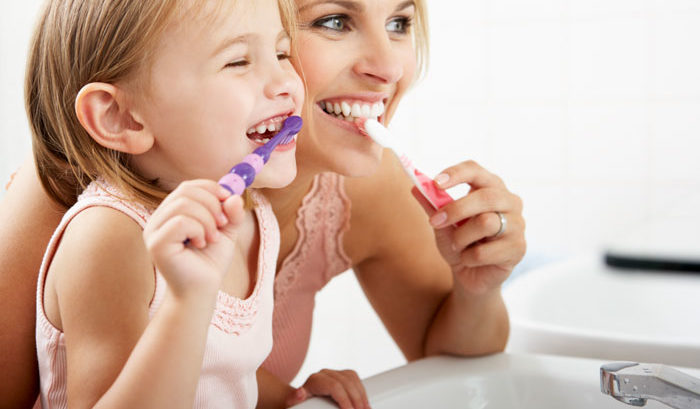A common question among parents is when they should begin teaching their children oral hygiene. Many dentists assert that parents can start laying the groundwork for good brushing habits before their child’s first tooth even breaks the surface.
According to the Centers for Disease Control (CDC), tooth decay is the most common chronic disease found in children and adolescents, and is four times more likely to affect teens between 14 and 17 than asthma.
But for many parents, getting their kids to brush their teeth is a battle not unlike getting them to eat their broccoli or go to bed on time, But it doesn’t need to be this way. There are many ways parents can set their children up for success when it comes to their oral health without needing to resort to bargaining or threats.
Start Early
For newborns, it is common for parents to use gauze or another type of clean cloth to wipe down their gums down after feedings to discourage germs and bacteria from lingering and developing into problems down the line.
According to the American Academy of Pediatric Dentistry (AAPD), a child’s first trip to the dentist should coincide with the arrival of the first baby tooth, and should happen no later than their first birthday.
Early exposure to dentist visits and cleaning their mouths can help get your child used to these activities in the future. Starting good oral hygiene habits early can help show them that these activities are not out of the ordinary and are just part of the routine and nothing to be afraid of or anxious about.
Lead by Example
Whether it’s what you say or what you do, kids love to imitate adults. So, when it comes to oral hygiene, make sure you’re setting a good example. Try dancing, making funny faces, or even singing or humming a song while brushing. No matter what you do, just be sure that your child sees you enjoying brushing your teeth. This will teach them that brushing is a fun activity that they can look forward to.
Make It Fun
Toothbrush makers know that the more fun they can make brushing for kids, the more likely those kids will grow into adults with healthy brushing habits. That’s why so many toothbrushes now come in flashy colors – some with cartoon characters, some that play music, and others that light up.
And while you won’t be able to find any toothpaste to sing songs to your kids, you will find it available in a variety of colors, flavors, and some even with glitter or other special effects.
Having a cool toothbrush may be half the battle but using positive reinforcement techniques to encourage your toddler to keep brushing also helps. Sticker charts, a special snack, and even an extra ten minutes of play time are all great ideas.
Find What Works
No two children are the same and what works for one, may not work for another. Some children’s gums may be more sensitive than others which will force parents to opt for soft or silicone bristled toothbrushes. Ultimately, it is up to you, the parent, to figure out what works best for your child and hygiene structure.
For parents with children who struggle with developmental disabilities such as autism, the process for learning good oral health habits may prove even more challenging. And with roughly one out of every 40 children in America diagnosed with autism, there is a growing need for more dentists and dental practitioners to be both better equipped and knowledgeable when it comes to serving patients with developmental disabilities.
If your child falls into this group, and getting them to practice good oral hygiene proves too strenuous for both of you, a Board-certified Behavior Analyst (BCBA) may be able to help.
The Right Choice for Your Family
When was the last time your child made a trip to the dentist? With our Comprehensive PPO dental plan, your family will have the freedom to visit any licensed dentist in the country. You can save even more when you visit one of over 135,000 preferred dentists and 32,000 specialists nationwide. Make your family’s oral health a priority by visiting https://nvbar.memberbenefits.com/dentalvision/ today.

